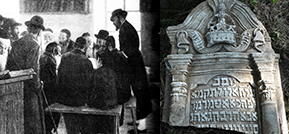Bochnia
Name in English:
Bochnia
Name in Ukrainian:
Бохня
Name in Polish:
Bochnia
Name in German:
Bokhnya
Name in Russian:
Бохня
Name in Hebrew:
בוכניה
Historical-cultural region:
Western Galicia
Coordinates:
49°58' N, 20°26' E
Administrative History:
| Years | Town | District | Province | Country |
| Till 1772 | Bochnia | Polish-Lithuanian Commonwealth: Kingdom of Poland | ||
| 1772-1918 | Bochnia | Bochnia | Galicia | Austrain-Hungarian Empire |
| 1918-1939 | Bochnia | Bochnia | Krakow | Poland |
| 1939-1945 | Bochnia | Bochnia | Under Nazi German occupation | |
| Since WWII | Bochnia | Poland |
Population Data:
| Years | Total population | Jewish population | Jewish ecentage of population |
| 1880 | 6480 | 927 | 15% |
| 1900 | 9550 | 1911 | 20% |
| 1921 | 11027 | 2459 | 22.3% |
| 1939 | approxemtly 2000 | 20% |
Items relevant to the community
| Title | Type of item | Years |
|---|---|---|
| 1. Sprawozdania dot. pogromów i ruchu antysemic... | CAHJP Cards | 1898 |
| Betr. die Ernennung von Bezirks- und Gemeindera... | CAHJP Cards | 1846 |
| Bochnia | Communities | |
| Correspondence with the Landesgubernium and dis... | CAHJP Cards | 1830 |
| Correspondence with the Landesgubernium regardi... | CAHJP Cards | 1825 |
| Correspondence with the Landesgubernium regardi... | CAHJP Cards | 1832 |
| Correspondence with the Landesgubernium, distri... | CAHJP Cards | 1847 |
| Correspondence with the Landesgubernium,regardi... | CAHJP Cards | 1793 |
| Gródek Jagełłoński, Grybów, Horodenka, Husiatyn... | CAHJP Cards | 1909 |
| Inwentarz m.Bochnia. | CAHJP Cards | 1676 |






